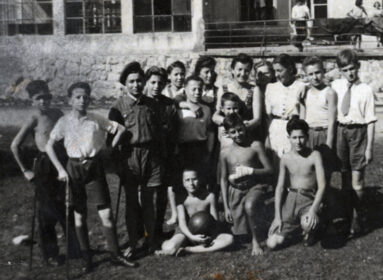By Alex Putterman
At age four, Robert Scherl’s athletic career was apparently over. Scherl had been diagnosed with Legg-Calvé-Perthes Disease (LCPD), a childhood condition that interrupts the flow of blood to the hip joint and often results in hip pain and noticeable limping. The disease, present in one in 1,200 individuals, is most common in physically active children like Scherl, whose parents say was “born with a football or a baseball bat in [his] hands.”
Now, a physician had informed the family, Scherl should avoid athletics and focus his interests elsewhere.
“He looked me in the eye,” Robert’s mother Wendy Scherl recalled recently, “and said, ‘I think you should consider getting Robert into art and computer because he’s never going to really be able to play sports.’”
This prognosis was unacceptable for the Scherls. Wendy and her husband David shepherded their son from doctor to doctor, seeing five in total, until Robert couldn’t take another appointment. One doctor suggested a wait-and-see approach. Another prescribed leg braces and a wheelchair. Another offered immediate surgery, which would have left Robert with a lifelong limp.
Finally, it was Dr. David Roye of Columbia University who told them what they wanted — even needed — to hear.
“There’s absolutely no evidence that playing sports or not playing sports makes any difference,” he said. “In medicine in general people will rely on conventional wisdom, ‘If you have a problem with the leg don’t use the leg.’ That’s not really the case.”
Athletic activity, Roye said, would be no hindrance to the treatment, and preventing a child from playing might even have a negative psychological effect. “Telling someone that they can’t do what is expected of them, it does have a real cost,” he said.
For Scherl, Roye’s blessing launched an athletic career that was inhibited early on by a slight limp and interrupted several times by surgeries to treat LCPD but has recently born the fruit of years of perseverance. In the fall, the 18-year-old Scherl, who lives with his family in Ridgefield, will enroll at the University of Chicago, where he will play baseball for the Maroons’ Division III program.
But first he will compete for his country at the 19th Maccabiah Games as a member of the U.S.A.’s juniors baseball squad. The Games opened in Israel on July 18. Scherl will be among 9,000 athletes from around the world taking part in the Games.
Such success once seemed both impossible and inevitable.
After his first surgery, at age seven, Scherl says he had to be re-taught the proper way to walk. That didn’t prevent him from ditching his wheelchair and crutches early to hit the baseball field as soon as he could. Only five weeks after the surgery, Scherl convinced his father to let him return to his Little League team before he was fully recovered. David Scherl, Robert’s coach, agreed to let his son bat, with a pinch runner employed to run for him from the batter’s box. This arrangement lasted one game, before, in game two, Robert hit the ball and ran to first, then refused to leave the field, defiantly rounding the bases himself.
Scherl and his parents were determined not to let LCPD slow his burgeoning passion. Right before the LCPD diagnosis, David Scherl had read “No Excuses,” the memoir of quadruple-amputee mixed martial artist Kyle Maynard. David was inspired by Maynard’s story and passed the book on to Robert. “No excuses” became a Scherl family mantra.
“We never wanted anything that he was going through to ever serve as a crutch or an excuse,” David Scherl says. “There would be obstacles, and he would have to overcome those obstacles, but there would be no excuses.”
“It made it a little difficult,” Robert says of his condition. “But from an early age it was just no excuses, you just go out there and keep playing like everyone else.”
As it turned out, the boy played better than almost everyone else. Scherl’s limp quickly disappeared, and he began to excel on the athletic fields in Chappaqua, N.Y., where he lived until age 16, before moving to Ridgefield. Growing up, Scherl played football, basketball and lacrosse, but baseball, he and his family agree, was always his passion. “Robert always loved sports,” his mother says. “But I’ve always said, when he was on the baseball field you saw his soul.”
Scherl abandoned football for good after his sophomore year of high school at The Hackley School in Tarrytown, N.Y. He focused his energy on baseball, playing first and third base and boasting a powerful bat derived from what Steve Pinto, his baseball instructor for three years, calls “a very smooth swing.” By late in his high school career, colleges were taking notice. Scherl says he received interest from several Division I schools and many Division III programs. Wanting to leave the Northeast, Scherl established a top four of Northwestern, Washington University, Harvard and the University of Chicago.
This spring, he settled on Chicago, where he will pursue an economics major while representing the Maroons on the baseball diamond.
Around the time he was deciding on his college future, Scherl was invited to try out for the U.S.A.’s Maccabiah baseball roster. The Games, a two-week long athletic event that takes place in Israel once every four years, is the world’s largest Jewish athletic competition. Participants of all ages represent their countries in more than three dozen sports.
Scherl, a proud Jew, was flattered just to be asked to try out and thrilled to be selected to the team. He describes himself as a “very, very patriotic person,” his American identity stemming from the attacks of Sept. 11, 2001, when his uncle escaped from the 84th floor of World Trade Center North Tower.
“I love this country,” Scherl says. “And being able to wear our country’s name on a uniform and represent our country in any athletic event kind of combines two of my passions. I’m honored greatly to be able to do it.”
Scherl’s parents are particularly pleased their son will be representing his country in Israel, surrounded by thousands of Jewish athletes with whom he can form relationships. It is, in the words of David Scherl, a “tremendous opportunity.” Both that opportunity and Scherl’s impending collegiate career were possible only through a work ethic that awed all observers.
“It’s a talent to be hard-working,” said Pinto, who played and coached at Manhattanville College. “I’ve seen a lot of hard workers, and he is up there, right at the top when it comes to hard work.”
Add Scherl’s doctor to the list of admirers. The Scherl family credits Roye for the sequence of successful surgeries, but Roye says it’s more complicated than that.
“Half of it is my surgery, half of it is the rehab,” Roye says. “If the kid isn’t really committed to the rehabilitation and isn’t focused on rehabilitations, it’s not going to work… What matters more is not the intervention but the motivation of the kid. And he is so motivated, and I just always knew he would battle back, and he did.”
Scherl himself is hesitant to consider overcoming LCPD in his athletic career as an accomplishment. His success is an accomplishment, of course, but the condition was not extenuating in his mind, only a variable to be nullified with hard work. In other words, it was no excuse.
Comments? email alexp@jewishledger.com.








 Southern New England Jewish Ledger
Southern New England Jewish Ledger















